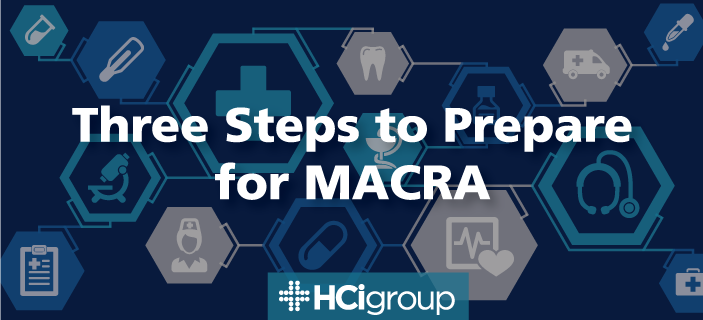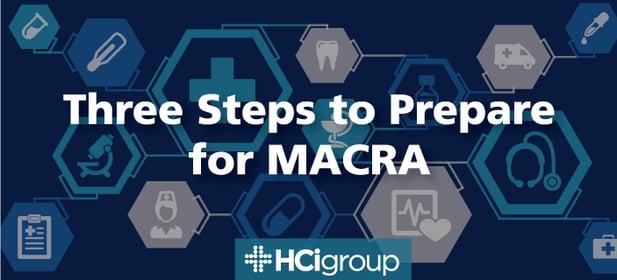Three Steps to Prepare for MACRA


Many healthcare organizations still don’t understand the intricacies of the Medicare Access and CHIP Reauthorization Act (MACRA), which took effect on Jan. 1. But organizations could incur fines or lose reimbursements if they don’t properly prepare for MACRA’s reporting requirements and payment provisions.
This post offers three steps that will help you prepare for, and benefit from, the new regulations concerning reimbursement for treating Medicare patients.
Technology and knowledge are essential for avoiding penalties and increasing revenue under the Medicare Access and CHIP Reauthorization Act (MACRA).
MACRA shifts how Medicare pays physicians for seeing Medicare patients from volume-based to quality of care. As a healthcare provider, you could incur fines or lose reimbursements if you fail to prepare for MACRA’s reporting requirements and payment provisions.
Ensure compliance and maximize revenue for your healthcare organization by following these steps to prepare for MACRA.
1) Learn
Start by getting a crisp view of MACRA. Don’t stop with the MACRA overview on the CMS website. If needed, consult with external subject-matter experts who can explain MACRA in terms that are relevant to your organization.
Key changes from prior regulations
MACRA replaces the Sustainable Growth Rate formula with the Quality Payment Program. In doing so, it has consolidated reporting on measures like the Physician Quality Reporting System (PQRS), Meaningful Use and Value-Based Payment Modifier.
What is my dollar impact potential?
MACRA could cost you in terms of penalties or negative payments. But you also could increase reimbursements. Calculating the potential impact on your organization can be complicated. Physicians often don’t have the time, ability or willingness to determine the impact themselves so many are turning to consulting companies, especially those they already know, that they’ve worked with in the past, are needing help to be able to figure out “What does MACRA mean?”
2) Assess
Knowing what you report to CMS now is the first step to identifying the changes you must make to prepare for MACRA. You also should know what technology you report with because that too can be affected by MACRA.
What are we doing now?
Look at the MACRA measures and see which overlap with your present requirements.
You also should identify items that are more advantageous for you to report. Look for what you’re filing and what you could be filing based on the strengths of your practice.
Are the people who need to work on this aware of what it is?
MACRA information emanates from clinical care but as a regulatory matter the people responsible compliance must be aware of their responsibilities as well and may need training and expert guidance to do this.
What our technology capabilities and needs with current tools?
CMS requires MACRA information to be filed in certain ways. The agency recommends that you ensure that your EHR is certified by the Office of the National Coordinator for Health Information Technology and that you use a qualified clinical data registry (QCDR) or a registry to extract and submit your quality data.
3) Plan for MACRA
Determine your MACRA strategy based on what you see your Medicare patients doing and your vision for your practice. Then establish a plan for reporting that includes the people, processes and technology that you will need to avoid penalties and to increase reimbursements.
Education and training
You may know which measures to file not to get penalized. But you also want to improve measures so that you can get more reimbursements. This requires good communication within your organization and with your patients.
Gap analysis of technology needs
You may need to get a filing method that is certified by CMS, like a qualified clinical data registry if you don’t have one already. You also could need to update or upgrade your EHR to be able to extract and report the data required.
You can begin participating in the Quality Payment Program between Jan. 1 and Oct. 2, 2017. Estimate the financial impacts based on when and how you plan to participate.
Develop a measure improvement plan and execute
Depending on the measures you choose, you may need to change your processes for gathering information to ensure that you collect the appropriate data. You also will want to improve your performance because your data will be publicly reported against benchmarks.

